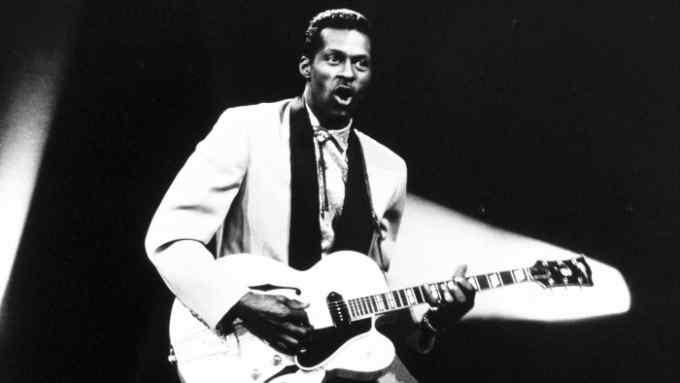Was Rocket 88 the first rock’n’roll record?

Simply sign up to the Life & Arts myFT Digest -- delivered directly to your inbox.
The life of this week’s song is the story of an entire musical genre. “Rocket 88” was a hit in 1951 for Jackie Brenston and His Delta Cats. Brenston was a saxophonist, the Delta Cats an R&B band led by Ike Turner (they also recorded under the name Ike Turner and his Kings of Rhythm); together they created an explosive song that is considered by many historians of popular music to be the first rock’n’roll record. Among the factors that have led to the singling out of “Rocket 88” is the fuzzy guitar sound, achieved thanks to a damaged loudspeaker (pop history is littered with damaged speakers: see The Kinks’ “You Really Got Me”).
But was “Rocket 88” actually the first rock’n’roll record? It’s tempting to reduce musical history to a series of key “moments” but in truth it is a process, and “Rocket 88” was only the latest in a series of recordings that took the structure of the 12-bar blues and, both figuratively and literally, electrified it.
The song’s immediate antecedents were the “jump blues” or “jump’n’jive” songs of players such as Chris Powell and Louis Jordan. Check out “Rock the Joint” by Chris Powell and the Five Blue Flames from 1949, or Jordan’s “Caldonia” from 1945 (and don’t get distracted by the subplot involving Jordan being attacked by his wife with a knife). The roots of rock’n’roll are clearly audible: the bassline, the beat, the energy.
The bassline in all these songs, played on an upright bass, is a direct descendant of the left-hand in boogie-woogie piano, the blues-based form that became a craze in the 1930s and 1940s, popularised by players such as Albert Ammons, Pete Johnson and Meade Lux Lewis. This music emerged from the logging camps of Texas and Louisiana and has been dated back as far as the 1870s; these camps would have had a shed, a supply of drink and a piano. There were even pianos aboard the trains carrying workers from one camp to the next.
As for the origins of the term “rock’n’roll”: according to the state of Ohio, which erected a plaque in commemoration, it was popularised by the DJ Alan Freed, who, from 1951, played the music on his “Moondog House Rock’n’Roll Party” radio show. But the term has history going back long before Freed’s days. In 1933 the Boswell Sisters performed, on film, a song called “Rock and Roll”; in a stylised maritime setting, the three singers sit aboard a mocked-up boat that is rocking and rolling — though this is just one big visual euphemism: the term’s origins are sexual. In 1922, for instance, blues singer Trixie Smith sang, simmeringly, “My Man Rocks Me (With One Steady Roll)”.

But “rock’n’roll” had connotations that were sacred, too. In a 1910 recording, the black vocal harmony group the Male Quartette sing about “rocking and rolling/in the arms of Moses”.
Even if “Rocket 88” wasn’t the first rock ‘n’ roll record, it marks a turning point: it’s about a car, the covetable Oldsmobile Rocket 88.
Boogie-woogie is the sound of a train running along the tracks, a connection made explicit in Louis Jordan’s 1946 hit “Choo Choo Ch’Boogie” (“Take me right back to the track, Jack”) but, by the 1950s, black Americans were moving north, earning better money and buying cars. “Rocket 88” is a song about mobility, with the car also serving as a metaphor for sexual prowess.
As for cover versions: Bill Haley and the Saddlemen (earthbound predecessors of his Comets) recorded it later in 1951, but theirs is a thin, countryish approximation. In 1958 Little Richard stole the song’s piano intro, virtually note for note, for “Good Golly Miss Molly”. But few have attempted to record “Rocket 88” because this thrilling, eruptive song is unimprovable.
Listen to the podcast
For more in the series, and podcasts with clips, go to ft.com/life-of-a-song
Photograph: Redferns

Comments